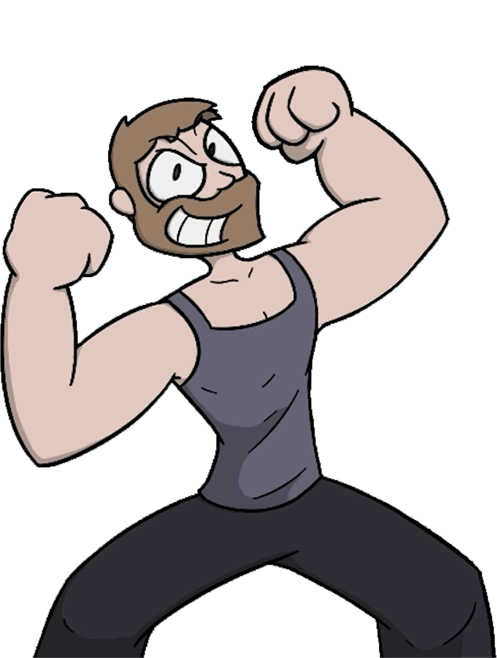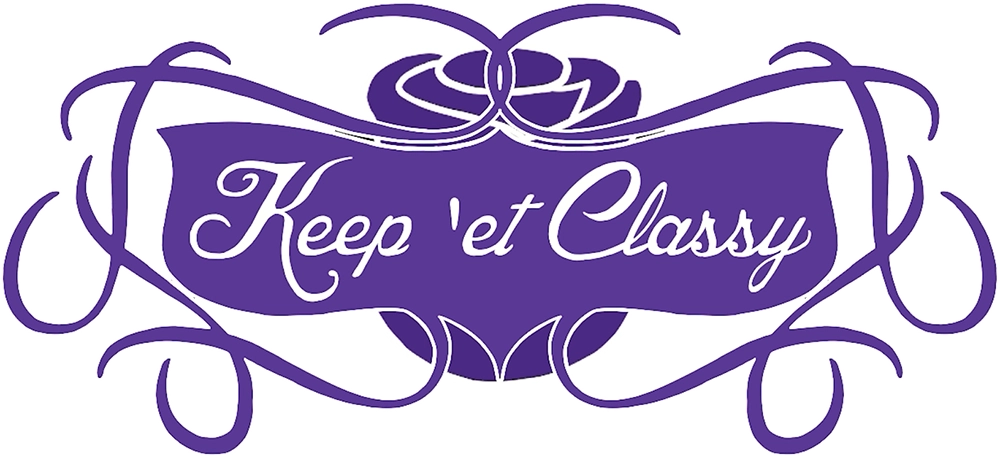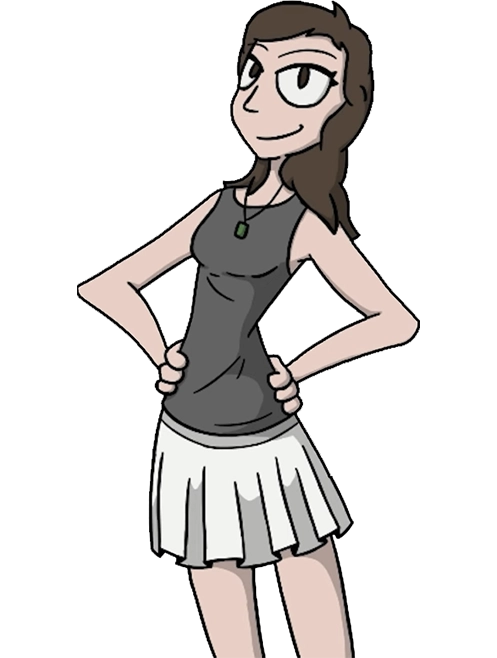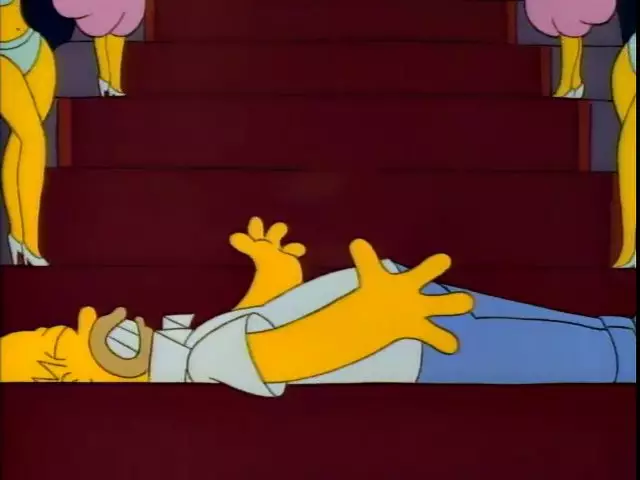My Recollection
I was about 8 and really wanted a spy camera. I had no reason to have a spy camera, as there was literally nothing I’d be photographing that I couldn’t do with a regular camera, but when you ache with want for a stupid and unbelievably cool doodad you’ll dream up a million uses. This same problem still torments me any time I think about buying anything that shoots, a grappling hook, or car. It was a more serious episode.
The Episode
The kinds of insight that drive good comedy will, over enough time, veer into prophecy. The most widely known example of this with The Simpsons is President Trump. Homer’s Night Out doesn’t have anything that simple and obvious, but it does tell a story of going viral ten years before that was even a phrase. It’s nothing short of amazing because it features every part of the modern story of inadvertent viral stardom, including the threatened employment that comes with publicly crossing a line of taboo.
Free from time, entropy, or any of the other grim forces of change, sitcom realities are universes of their own. Homer never loses weight. He never gets promoted. And, in spite of how any episode ends, he never learns any lessons. This existential immobility is a fundamental part of non-serialized sitcoms, it’s a foundation made invisible through its omnipresence so highlighting it would be like doing an episode of Friends about gravity. It’s an always thing, so characters only being bothered by it sometimes points out the flaw and unravels the world. This episode highlights a large passage of time, a 6 month period represented by Bart ordering and receiving a mail-order spy camera, but uses the jokey irrelevance of it as a set-up gag to void the existential threat while still showing the viewer how grim Homer’s rut is.
He makes light of his assistant drunkenly hitting on a girl (who Homer believes has a crush on him), laments his weight, and resolves to exercise. Six months later, he’s still the same weight and his former assistant, now his supervisor, is engaged to the girl he hit on. The former point being an incredibly sore one for Homer as Marge near passive-aggressively questions him about it. Speaking of Marge, her role in this immobility is nicely highlighted as she’s the reason Homer stops exercising in both scenes. Her reassurance that she loves him big, and her warnings about the potential strains Homer could inflict upon himself as he jiggles in the bathroom are enough to thwart his attempts at self-improvement. It’s the grim counterpoint to the idea of unconditional love, encouraging change suggests fault so Marge’s love must be unconditional because seeing one fault will bring her whole sad reality into focus. She can’t let one thing in, and so fulfills her role in the vicious cycle.
Bart buys a spy camera from the back of a comic book. A spy camera is like the camera on your phone only it’s bigger, doesn’t do video, and requires film. Film is this weird plastic-y salad cameras ate that would remember light. You’d take the full plastic salad to a shop or kiosk in the mall and they’d talk the plastic into telling them it’s secrets which would then be drawn onto special paper by fine artists. You’d get your photos after a few hours and only then would you find out that the light was shit or you’d covered the lens with your thumb. The lack of omnipresent recording technology makes this plot point a functional part of the main story and not a B story, it’s wound into the main plot by the second act as Bart’s need to have the photo developed is the catalyst to the image going viral.
Homer has the night away from the family to attend the buck’s night and, because Homer isn’t there, Marge takes the kids out for dinner. That both of these events happen at a restaurant, The Rusty Barnacle, strikes me as a tad odd. I know plenty of buck’s nights start at a place with food, and a lot of bars do have restaurant sections, but this is a restaurant letting a buck’s party with belly dancer happen in one of its rooms and that’s a bit mental. A buck’s party is a living skidmark that shits up anything it drags itself across, you can’t have them near normal humans and children even if it’s just as they’re leaving. I know someone who’s buck’s night involved a stripper sticking a lollipop up her ass and then getting him to suck on it which he fucking hated but went along with anyway because peer pressure is hilarious. Up her ass. There aren’t a lot of other sensible ways to get Bart and Homer together for this, and maybe family restaurants do buck’s nights in the States, I dunno. But it’s always stuck with me as peculiar. Bart uses the spy camera to take a photo of Homer cavorting with Princess Kashmir and gets it developed at the school photography club’s dark room. Naturally, all the students want a copy.
Abundance has caused a kind of porn inflation that would make this hard for the younger elements of the generation to understand. I know someone whose first exposure to porn was an mp4 of a guy fucking a fish. This is the early 90s, what actual porn that was widely available was pretty much all titty with some gentle hints of vulva and even that was a fucking challenge to get (unless you had your own TV that got SBS). The picture of Kashmir is literally nothing by modern standards, I think the Jasmine girl at Disney World is more provocatively dressed, but its historical placement lends a her tittilative value to a bunch of ten years olds and married adults a legitimacy that would appear strange today. The image goes viral, which is quaintly shown happening via direct conversation, photocopy, and fax. Aside from these retro elements, the whole thing plays out exactly like our modern understanding. People make fun of Homer on the street (though at this point he doesn’t know why), Marge kicks him out when she finally gets a copy, and he even has his job threatened because of how it reflects on the power plant. It’s a common story today, and there were real examples of analogue viral fame from the before time, but this is so early and accurate that it’s eerie.
Marge’s reaction is hypocritical bullshit given that she was only just mulling over an actual affair with Jacques. Homer’s dancing with a fucking belly-dancer, she’s not even naked, Marge was driving to commit adultery because she was annoyed with Homer but she still treats this like he was caught on To Catch a Predator. Homer stays the night at Barney’s, worth a few gags, but eventually begs his way back into the house for the final act pivot to correcting Bart’s attitude toward women.
Bart has been largely perfunctory over the episode, serving as a narrative tool via the spy camera before vanishing amidst the fight between Marge and Homer, so the story’s turn to being about what effect Homer’s behaviour has had on him falls flat. We don’t actually see any indication that this has even happened until the final moments of the episode making it look like a deliberate creation to fit Marge’s complaint as opposed to something that was actually happening that Marge noticed. Starting the thread earlier, like when he was getting the photo developed, would have taken just a few lines of dialogue and internally validated the third act. What conversation that’s there does suggest that Bart is using the fact that it’s his dad in the photo for status, but there’s no clarification as to whether it’s because Bart’s impressed by him or laughing at him. The largely adversarial relationship between Homer and Bart means it could easily be either. There are frequent suggestions of a kind of respect that Bart is either unaware of or keeps well hidden but this is so frequently worked against by the rest of Bart’s behaviour that it needs to be actively drawn out each time. The idea that Homer has to correct Bart’s impression of women is a good one and leads to a solid joke where Homer pursues this end by taking him around strip clubs and mud wrestling venues looking for Princess Kashmir, but without the foresight of a setup it lessens the impact of the shows final moments.
Homer ends the episode with a heartfelt speech about how women are more than curves, and how much he loves his wife, to the audience of a weirdly upscale show. I’m guessing this was because it looked a lot better than Homer delivering a speech in an actual strip club, but it looks like he’s interrupting an actual stage show with faintly bawdy lyrics and not some nefarious lair of the male gaze. About the only thing of note here is that Mr Burns, who believes Homer to be a master seducer based on his photo, is in the audience and ends the episode believing that Homer is a love machine.
It’s a cheesy wrap up to a problem the story only bothered to manufacture about 5 minutes prior. The show is never going to get into the complexity of objectification, especially not anything close to something that is supportive of sex workers, so there was always going to be a fairly superficial end. The idea makes a nice pivot from an expected family drama, the story could have easily spent the remaining time on Homer getting back together with Marge, but it lacks connection to the rest of the story. This is particularly noticeable given that the first two strands, Homer going to the buck’s night and Bart buying a spy camera, are brought together very well. Homer’s Night Out, has some good moments and jokes, but its quality is more in its prescience than its story.
Yours in being able to love about a million girls, Gabriel.
Jokes, lines, and stray thoughts.
Homer sulking about his weight with the line, “Why are all the good things so tasty” doesn’t make a lick of sense. Neither good nor tasty translate to fattening.
The show does the old TV bit of cutting to a photo developing to show what Bart has photographed with his spy camera which, like the dial up sound, is a concept lost to the ages. It also assumes Bart didn’t fuck any of the photos up which is a pretty big assumption. This was a problem the younglings will find funny, that you could fuck up your photo and only discover this a minimum of a few hours later and after you’d paid for the privilege. On the plus side, you couldn’t delete embarrassing ones and that made for some chuckles.
It still weirds me out that a restaurant with a kids menu would also host a buck’s party, it makes me picture a buck’s night roaring at a Sizzler.
The photo lab’s Future Photographers of America is a who’s who of background nerds that were deleted to make way for the modern cluster of dorks.
There’s a cultural strata of lost viral content from back when it was all physical pictures and VHS, some of which is still tough to find on the internet because it requires someone to bother scanning and uploading it. Some of it shows up on found footage websites, which are a bundle of fun to poke about if you like seeing absurd 80s employee orientation videos and the like.
While Homer is being bothered by people for his viral fame, he mentions the abundance of weirdos in the Kwik-E-Mart to Apu who replies with, “Oh sir, I’ve seen things you can’t imagine” which is a beautifully written and delivered line. “Can’t imagine”, innocuous at first glance and delivered in a way to emphasise this, is an idea that grows darker the more light you shine. What is something so vile you cannot even imagine it? It’s both a threatening challenge to the casual viewer and a wonderfully esoteric reference for the people who have worked these jobs and seen these things. I was buying a sausage roll (it was 3am, fuck you) from a Night Owl once and a fat guy who looked like he’d staggered out of a Lowes ad was slumped against the far refrigerator with his nubbiny little dick out, peeing a clear, determined stream so perfectly vertical it created a fountainlike umbrella of pants drenching pee. He looked at me as though I’d the ill manners to stampede into his private wash room without knocking while the employee silently fetched my sausage roll. I applied my sauce as he finished and walked out knowing that this was just a case of the Mondays for the poor soul working there.
There’s an actual lady at Moes for ladies night, which I think is about the only time there’s a woman in Moe’s proper (not during one of his successful turns or bar changes) who isn’t a story character. Her presence is appropriately depressing.

Homer stays with Barney after Marge kicks him out and we get to see the squalid conditions of Mr Gumble’s existence. The line, “If you get hungry in the middle of the night, there’s an open beer in the fridge” is pretty fucking funny for the extremity of it. Not even a fresh beer, Barney? Christ.
This scene rolls on to another good joke where Homer gazes out over the town and remarks about how he knows a distant light is his because it’s his porch light left on. They don’t have a porch, let alone a porch light, but this error is overshadowed by Barney immediately calling Marge to yell at her for wasting electricity that Homer has to pay for. It’s ridiculous, and the exact last thing you’d want a friend to do if you were in trouble with the missus, but it’s a fantastic layer of depth to Barney as a character. He’s at once able to put together enough details to register the light as a problem and yet misses the social impropriety of calling about it. It places him firmly, if barely, on the side of the drunk line that explains why he isn’t homeless.
This is about the first time we see Burns as anything but a supremely confident robber-baron as he begs Homer for advice on succeeding with women. I’m not a fan as it clashes with every other aspect of his character.
There is an initial sense of absurdity to how many titty based businesses a small town like Springfield can support, but these things were far more popular before I could watch a woman blow a dog on my phone.





1 replies to Homer’s Night Out
Daniel C on 24th September 201724 Sep 17 said:
The fact that you have to justify getting a sausage roll at a store infuriates me to no end. The wage gap can wait, I'd rather live in a society where I don't get chewed out for getting a gas-station hot-dog.
Comment on Homer’s Night Out
To reply, please Log in